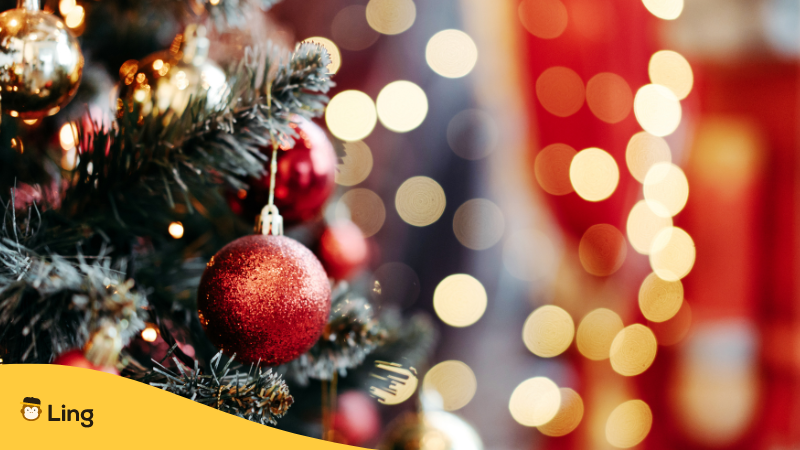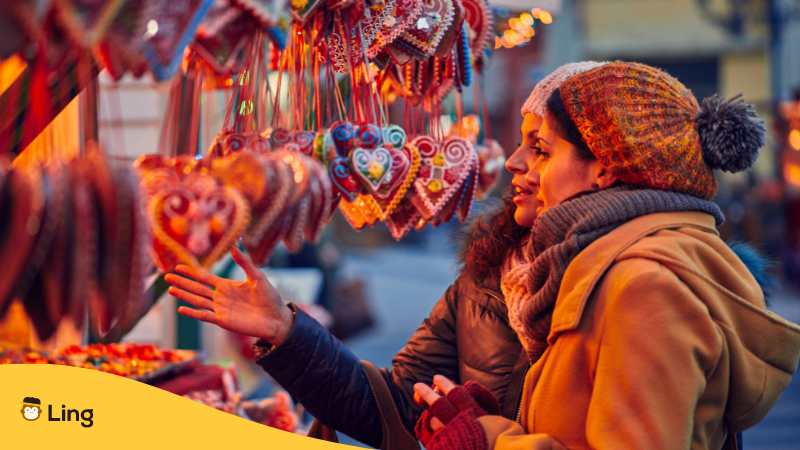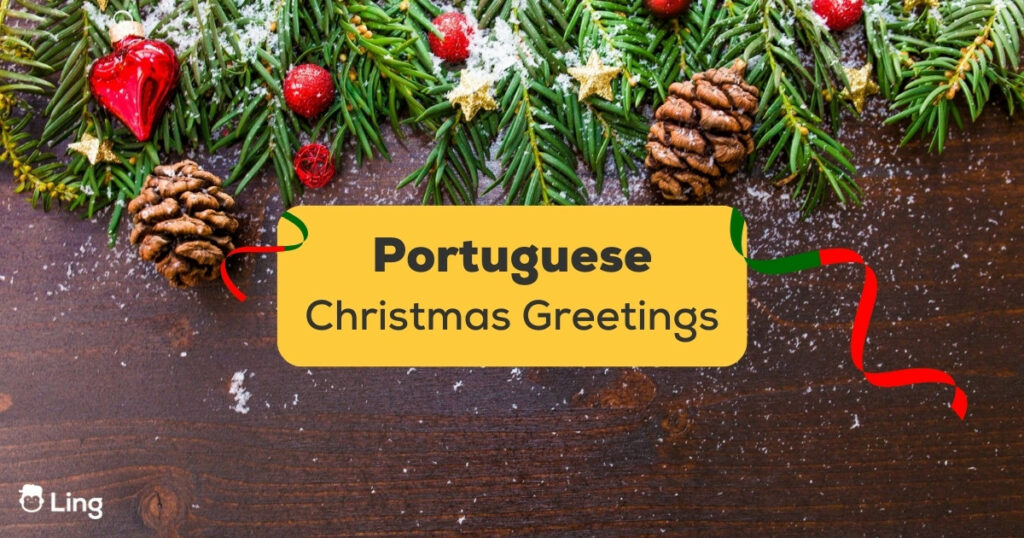Are you curious to know the most common Portuguese Christmas greetings? Suppose you celebrate Christmas eve with friends in Portugal or with Portuguese people. In that case, it is essential to learn how to say Merry Christmas, happy holidays, and several other holiday season greetings.
Fortunately, they are easy to learn, and in this article, you will discover the most common ways to wish Merry Christmas in Portuguese.
Most Common Portuguese Christmas Greetings
Christmas is approaching, the lights are already on, the shops are already decorated, and people are walking around with bags and packages in their hands. But what are the Christmas greetings in Portugal?
Here are the most common Christmas and holiday greetings you can use with Portuguese people:
- Merry Christmas – Feliz Natal
- Happy holidays – Boas Festas
- A Merry Christmas and a Happy New Year – Um bom Natal e um feliz Ano novo
- Happy holiday wishes! – Votos de festas felizes
- Happy holidays with lots of peace, love and joy – Boas festas com muita paz, amor e alegria
- Feliz Natal e um próspero ano novo – Merry Christmas and prosperous New Year
- Merry Christmas, filled with love – Um feliz Natal, repleto de amor
- May all your wishes come true! – Que todos os seus desejos se realize!
- Merry Christmas to you and all your family! – Feliz Natal para você e toda sua família!
Christmas And Holiday Season Vocabulary

You might also need to know and understand other words used often during Christmas and throughout the holiday season. It is essential to know and understand at least the most important words that most people can use.
Here are some of the most common words to know:
- Christmas eve – Véspera de Natal
- Christmas day – Dia de Natal
- Christmas card – Cartão de Natal
- Christmas tree – Árvore de Natal
- Presents – Presentes
- Candles – Velas
- Santa Claus – Papai Noel
- Snow – Neve
- Snowman – Boneco de neve
- Nativity scene – Presépio
- Christmas Dinner – Ceia de Natal (Consoada)
- Christmas Carol – Canção de Natal
- Decoration – Decoração
- Reindeer – Rena
- Chimney – Chaminé
What Are The Portuguese Christmas Traditions?
Like in any other country, people in Portugal follow strict traditions during Christmas time.
Following tradition, Portuguese families gather for dinner on December 24, where cod dishes are served. In addition, roast turkey and other meat dishes (typically enjoyed in the following days) have started to be included in the menus.
As a dessert, you cannot miss the Bolo-Rei (the King’s Sweet) stuffed with candied fruit, dried fruit, and other typical sweets.
At midnight the Missa do Galo (Rooster Mass) is celebrated. In the churches and houses, there is a unique space dedicated to the nativity scene, where the environment in which Jesus was born is recreated.
Christmas gifts are exchanged after midnight or on the morning of December 25, depending on the habits of each family. In the past, before Santa Claus left the gifts under the tree at Portuguese Christmas, it was the Child Jesus who brought them.
Before going to sleep, the children left their slippers on the fireplace, and in the morning, when they woke up, they discovered what surprises he had left for them.
On the night of December 24, a large bonfire is organized in the churchyard in cities such as Bragança, Guarda, Castelo Branco, and other small towns. It is a meeting point for exchanging Merry Christmas greetings between friends and neighbors.
After New Year’s Eve, the festivities end on January 6, the Day of the Three Kings. On the streets, near the monuments and churches, you can hear the “Janeiras,” traditional songs wishing for the new year.
Portuguese Christmas Dinner Traditions

Did you know that Christmas dinner is called Consoada, a term derived from the Latin “consolata” from “consolare”?
On the 24th evening, they generally eat cod with boiled potatoes, cabbage, carrots, chickpeas, and a lot of olive oil.
Instead of cod in the north and the islands of the Azores, one finds on the Christmas tables the octopus guisado, accompanied by potatoes and Portuguese cabbage, or the baked octopus. Both are accompanied by fried or toasted bread.
It ends with sweets such as aletria, rabanadas, and filhoses.
On the 25th, for lunch, instead, we eat turkey stuffed with sausages, meat, bread, and spices—a tradition imported from the United States by the Spanish. In the Azores, chicken is prepared with bread, eggs, spices, liver, and olives instead of turkey.
Some also place the entrails, the skin, and the meat.
A variant of turkey on the tables of mainland Portugal is the kid that is cooked in a wood oven. The typical sweets of this era are inevitable, such as: filhoses, azeveias, sonhos, coscorões, broas, rabamadas and bolo rei.
Obviously, each region then has its typical recipes that differ.
Christmas Curious Traditions To Know
Each region in Portugal has its different popular traditions. If we wanted to take a virtual trip to Portugal and its traditions, I would like to tell you four curiosities that I have recently discovered:
Caretos de Varge
In Trás-os-Montes, one can participate in the Festa dos Rapazes (children’s party). In addition, a festival linked to the sun’s return is celebrated on December 24. After that, the days begin to get longer.
During the festivities, masked men, the caretos, bring chaos to the country of Varge, assaulting (obviously not really) the women, thus symbolizing the return of the fertile land.
Caretos de Ousilhão
Similar to the feast of Varge, Ousilhão also celebrates the sun’s return with masked boys who dance ancestral music.
Guimarães Pine
We are still in the north of Portugal, more precisely in Guimarães, where on November 29, a huge pine is cut and loaded with the help of oxen up to the historic center.
Braga Bananeiro
In Braga on the night of the 24th, citizens gather in a small tavern to the sound of gaitas-de-fole galega, a sort of bagpipe, drinking moscatel (a fortified wine) and eating bananas.
Christmas Bonfire
In some cities such as Bragança, Guarda, or Castelo Branco, a large bonfire (madeiro) is lit in front of the church that will last all night to warm the newborn baby or, to symbolize the return of the sun that illuminates the night.
Now that you know how to say Merry Christmas in Portuguese, would you like to learn more about this language?
Learn Portuguese Using Ling App

If you want to learn Portuguese, you can use a great tool such as the Ling app!
With this application, you can speed up your learning process and become fluent in Portuguese with little effort. In addition, if you wish to learn any other language with Ling, you can choose between the other 60 options.
Moreover, suppose you like to know more about Portuguese traditions. In that case, you can find more helpful information in the following articles: Is Portuguese Hard To Learn? and Portuguese Slang Words To Sound Like A Local!
Are you ready to try it out? Download the app for free on the Play Store and the Apple Store today!



































































